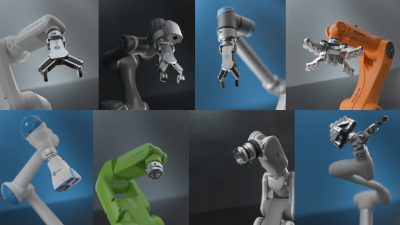
OnRobot A/S continues to drive its mission of making robotic applications faster and easier to implement with a unified mechanical and electrical interface for any OnRobot end-of-arm tooling (EoAT) that simplifies automation. Now, with a single robotic system, single platform for programming and training, and single vendor relationship, manufacturers have access to a full range of tools, full robot compatibility, and virtually unlimited possibilities for collaborative applications. This new one-system solution speeds deployment so manufacturers save time and money and can quickly realize the benefits of automation.
OnRobot A/S previously released its digital I/O converter kit, which allows OnRobot end-of-arm tools to work with a full range of leading collaborative and light industrial robot brands including Universal Robots, KUKA, FANUC, Doosan, Techman, Yaskawa, Mitsubishi, Kawasaki and Nachi. Building on that initiative, all OnRobot products now have a unified mechanical and communications interface based on the OnRobot Quick Changer, which is now an integrated part of all OnRobot products. An additional Dual Quick Changer incorporates these same new capabilities while allowing the use of two tools in one cycle, mixing and matching to suit application needs and maximizing robot utilization.
“Manufacturers are demanding more from their robotic applications, and end-of-arm tooling has become the key to optimizing their investments,” says OnRobot CEO Enrico Krog Iversen. “This integration of our Quick Changer across our current product lineup makes it easier than ever to switch between tools and robot types, allowing flexibility and reducing downtime for more efficient production and faster automation ROI. This brings us another step closer to a unified OnRobot one-system solution that makes it easy, fast and cost-effective for manufacturers to build collaborative applications, no matter which robots they choose.”
IDC's Research Director for Intelligent Operational Systems and Robotics Remy Glaisner welcomes the One-System solution: "The benefits of robotics across the industrial operating environment is routinely hindered because of systems' limited versatility. Actuation capabilities are therefore critical to the applicability of solutions across a variety of manufacturing use-cases. An adaptable end-effector solution translates into accrued technology adoption, enabling a new level of nimble operational effectiveness."
Robot manufacturers also greet OnRobot's announcement with enthusiasm: “OnRobot’s easy to integrate and capable one-system solution coupled with Yaskawa Smart Series robots and technology enable collaborative automation that is easy and quick to deploy while delivering high throughput and efficiency,” said Chetan Kapoor, senior director of technology innovation at Yaskawa America, Motoman Robotics division.
Unified Platform Across Tooling and Robot Brands With the OnRobot Quick Changer, a single cable provides a universal interface for tools and communications, so there is no need to disconnect cables when changing tools, and extended communications options support a full range of robotic platforms.
For Universal Robots robot arms, OnRobot now provides a unified URCap that allows all tools to work together, even in a single program. For example, using the new Dual Quick Changer, manufacturers can use an RG2 two-finger gripper together with a VG10 vacuum gripper in one cycle, achieving greater utilization of a single UR robot. Thanks to the unified programming solution, the setup time on UR robots is now faster than ever.
All OnRobot products now have a unified communication platform using standard fieldbus protocols, making it easy to program the tools, regardless of robot used. With the new fieldbus protocols, manufacturers can easily set software values and use more functions via a standard Ethernet cable, supporting an increased level of sophistication with a simple plug-and-produce approach that doesn’t require additional cables. Deployment time can be cut from 3 hours to 30 minutes, so manufacturers can get their collaborative application up and running quickly.
For robots that connect through digital I/O, the new OnRobot one-system solution includes a WebLogic interface. Using the IP address of the OnRobot Compute Box, manufacturers can sign in via the OnRobot WebClient from a phone or any other network-connected device to monitor the robot or create simple robot programs. Manufacturers can preset values and create elaborate programming logic using the feedback values from OnRobot grippers and sensors to provide finer control. This makes OnRobot tools compatible with an even broader range of robot arms and helps manufacturers get their collaborative application up and running quickly.
Along with the new one-system solution to simplify automation, OnRobot continues to improve its EoAT to meet changing market demands. The RG2 and RG6 grippers have been redesigned to be stronger, more sensitive and easier to mount. The grippers also come standard with TÜV certified Cat. 3, PLd level safety guards. The Gecko Gripper’s pads have been improved with a maximum payload, depending on the material, now up to 6.5kg.
Contact Details
Related Glossary Terms
- industrial robot
industrial robot
Robot designed for industrial use. Primarily used as a material-handling device but also used for changing tools, assembling parts, and manipulating special tools and measuring devices. Depending on design, an industrial robot can be programmed to perform a task by means of a controller, or it can be “walked” through the required movements by utilizing a digitizing system that translates movements into commands that the robot can be “taught.” See robot; teaching pendant.
- payload ( workload)
payload ( workload)
Maximum load that the robot can handle safely.
- robotics
robotics
Discipline involving self-actuating and self-operating devices. Robots frequently imitate human capabilities, including the ability to manipulate physical objects while evaluating and reacting appropriately to various stimuli. See industrial robot; robot.
